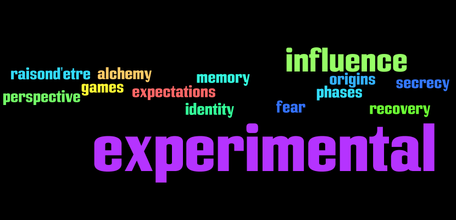What is an experimental?
An experimental is a multidisciplinary research project on a central theme or idea. All different aspects of literature, art, math, history, science, etc. are spun together in a web linking to the central theme in order to meet a specific line of inquiry. This project then also is connected to our lives, our society, and the world.
What are we doing?
Over the next couple of weeks, we will be examining the intricate theme of memory. Memory includes remembrance and forgetfulness. Some things we researched right away were childhood memories, ancient history and technology records, photographic memory, "Super" memories, memory changes over time, lies in our memory, historical events and memorable people, and earliest memories. Our interest in this topic was primarily due to many reasons. Of course, one of the reasons we stumbled upon this topic was due to our English teacher, Ms. Bartscherer's, recommendation.
Our main question of inquiry was "Are we defined by our memories?" Some other questions we asked ourselves are:
How the mind controls what we remember?
What different events or movements affect our memory?
How do diseases affect the way we remember?
How do memories of our childhood affect who we eventually become?
How are people remembered in history?
How do we want to be remembered?
Is forgetting part of moving on?
How do diseases control our memories?
To what extent do people go to rid themselves of certain memories?
Our topic can be branched out in so many different directions. In science we wanted to learn about how the brain controls what we remember on a neurological basis, memory disorders and diseases, muscle memory, and how the senses trigger our memories. In history, because every event can be considered memorable, we wanted to focus in on the Holocaust and 9-11 as our two main memorable events. We then wanted to go into more depths about the decades in America during the 20th century as well as events in European history. We also wanted to figure out what makes an event memorable in history? We wanted to explore different techniques to help in memorization such as mnemonic devices in math and every aspect of school. We wanted to examine the different ways different religions remember people by after they are dead. We also wanted to examine trends and recalling phases, witnesses in crime scenes, and technology storage.
Our main question of inquiry was "Are we defined by our memories?" Some other questions we asked ourselves are:
How the mind controls what we remember?
What different events or movements affect our memory?
How do diseases affect the way we remember?
How do memories of our childhood affect who we eventually become?
How are people remembered in history?
How do we want to be remembered?
Is forgetting part of moving on?
How do diseases control our memories?
To what extent do people go to rid themselves of certain memories?
Our topic can be branched out in so many different directions. In science we wanted to learn about how the brain controls what we remember on a neurological basis, memory disorders and diseases, muscle memory, and how the senses trigger our memories. In history, because every event can be considered memorable, we wanted to focus in on the Holocaust and 9-11 as our two main memorable events. We then wanted to go into more depths about the decades in America during the 20th century as well as events in European history. We also wanted to figure out what makes an event memorable in history? We wanted to explore different techniques to help in memorization such as mnemonic devices in math and every aspect of school. We wanted to examine the different ways different religions remember people by after they are dead. We also wanted to examine trends and recalling phases, witnesses in crime scenes, and technology storage.
Picture:http://www.waukesha.lib.wi.us/about/wordwork.shtml
Pulling it all together!
We've concluded that memory effects all aspects of your life because it defines who you ultimately become. Your memories guide the course of your life, influencing you in ways you would never imagine. Throughout this experimental process we've learned that throughout history, traumatic events scar you are almost impossible to forget. Events such as the Holocaust, 9-11, along with many genocides and wars throughout history are ingrained into the people's minds that witness the occurrence of these events forever. Patients suffering from amnesia and Alzheimer's disease lose their identity along with their memory so they ultimately end up with no recollection of past events or loved ones that have shaped their life. As Joseph DeLoux says, "we are our memories". We realized that without our memories we can't become the people we want to be in the future. Our memories push us forward and help us through difficult situations. However we have also concluded that forgetting is a part of remembering, without the ability to just let go we cannot make room in our brains for new memories to be created and made.

